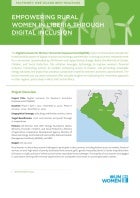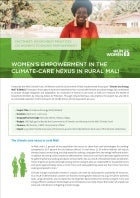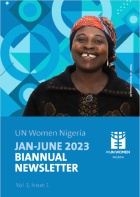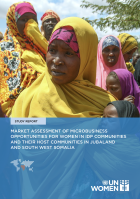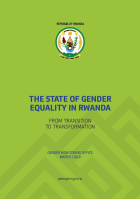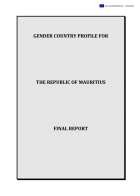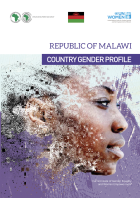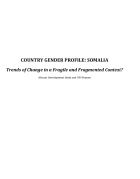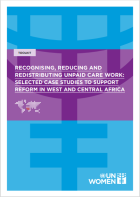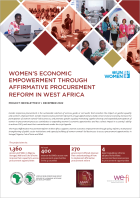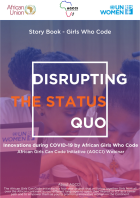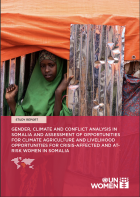1 - 20 of 39 Results
Pagination
Date:
The transition to a low carbon economy is leading to important socioeconomic transformation in sub-Saharan Africa. The green transition can help governments align their development strategies. Gender equality and women’s and youth employment are critical priorities. This toolkit helps stakeholders involved in the process of formulation or revision of climate change and green policies (i.e. NDCs or NAPs) to identify opportunities to maximize co-benefits of gender equality and climate action.
Date:
This publication is part of the WEE WCARO Best Practices series. The Digital Inclusion for Women’s Economic Empowerment (D4WEE) project in Liberia demonstrates the transformative power of digital inclusion and strategic partnerships in driving economic empowerment for rural women. Rural women face challenges to participate in the economy, including limited access to markets, financial services, or land. By connecting women to markets, enhancing access to finance, and promoting renewable energy solutions, the project leverages technology to improve women’s financial inclusion.
Date:
This publication is part of the WEE WCARO Best Practices series. The ‘‘Climate and Energy Mali” (CEMALI) project trained women in the production of improved cookstoves and sustainable fuels, reforestation activities, forestry management, and improved and efficient carbonization techniques. The project has contributed to climate change mitigation and adaptation, a reduction of women’s unpaid care work, and improved health of household members. This factsheets outlines the project's approach and results.
Date:
Under the leadership of the Ministry of Gender, Child, and Social Welfare, in collaboration with the Ministry of Peace Building, and with support from UN Women and international funding, the Women’s Charter empowers women and girls to engage with the Reconstituted National Constitutional Review Commission (R-NCRC). Launched on May 29, 2024, in Juba, the Charter addresses twelve critical themes, advocating for comprehensive legal, policy, and programmatic interventions in the Permanent Constitution-making process.
Date:
Explore the strides made in empowering women entrepreneurs in West Africa through the Affirmative Procurement project. These fact sheets provide an in-depth look into progress made in Côte d’Ivoire, Mali, Nigeria, and Senegal highlighting initiatives aimed at supporting Women-owned/led Small and Medium Enterprises (WSMEs) within the procurement landscape.
Date:
Discover the impact of the Affirmative Procurement Reform in West Africa project in empowering women entrepreneurs across Côte d’Ivoire, Mali, Nigeria, and Senegal. This newsletter showcases policy reforms, capacity-building initiatives, and success stories aimed at enhancing women's participation in procurement.
Date:
The newsletter highlights efforts in Nigeria to promote gender equality and women's empowerment, emphasizing advocacy during the 2023 General Elections. It features initiatives such as assessing UN Women's Strategic Note, launching a strategic framework for development partners, and showcasing technological innovations by young Nigerians. Economic empowerment through affirmative procurement and human-interest stories are also included, as well as partners' contributions.
Date:
The publication aims to understand the current landscape of microbusiness in terms of the opportunities, barriers and challenges that women in displacement settings face in accessing economic opportunities in the cities of Kismayo, Dollow and Baidoa
Date:
This publication highlights the progress and prevailing gender gaps in Rwanda so far as far as Gender Equality and Women's Empowerment is concerned. It also gives insights into the state of gender equality in the National Strategy for Transformation (NST1) pillars.
Date:
The Gender Country Profile publication for the Republic of Mauritius documents the progress achieved towards the attainment of gender equality and examines how far the Republic of Mauritius has been able to address gender gaps and empowerment of women in line with the various regional and international conventions ratified.
Date:
The Malawi Counrty Gender Profile publication presents a review of existing gender issues identified through a review of documents and reports recently released. The generic purpose of Country Gender Profile is to strengthen national understanding and data on the advancement of international, regional and national commitments towards Gender Equality and Women's Empowerment.
Date:
The publication presents a Country Gender Profile for Somalia examining core trends in gender and inclusion, new policies and legalisation, and institutional capacity to promote gender equality, particularly in a fragile and fragmented context, with change and progress assessed since 2012.
Date:
Unpaid care work by women is one of the most important constraints they face in running their businesses or advancing in their careers. This toolkit presents a compilation of case studies that have been selected to support governments and civil society in dialogue around the implications of unpaid care work on women’s lives and countries development outcomes and for positioning (unpaid) care reform in a more central role in policies in the region.
Date:
Women’s unpaid care responsibilities are one of the main barriers preventing women from fully profiting from new jobs created in the green economy and is limiting their contribution to climate change mitigation and adaptation. Therefore, this brief calls for action on adopting appropriate public policies to ensure that women get an equitable share of green jobs; balancing men’s and women’s responsibilities for care; supporting private sector development in the care sector to scale-up promising solutions and increasing access to time-saving and energy-efficient infrastructure.
Date:
The Project Affirmative Procurement Reform in West Africa supports women economic empowerment through policy reforms, institutional strengthening of public sector institutions and capacity building of women-owned/-led businesses to access procurement opportunities in Senegal, Nigeria, Cote d’Ivoire and Mali.
This newsletter is distributed every six months, covering the journey of the project implementation across the most important events, outcomes, perspectives and other relevant information on gender responsive procurement.
Date:
Drawing on an assessment of the needs of rural women in Senegal, Mali, Liberia, Malawi and Haiti, and on an ecosystem mapping and market dialogue process, these infographics illustrate the challenges that rural women face to access resilience-building services that are tailored to their needs, and provide insights into gender-responsive policy measures and innovative solutions to respond to the women’s needs and build their resilience to climate change and disasters.
Date:
Gender responsive approaches in Climate Smart Agriculture.
Date:
The policy brief aims to serve as an synthesizes and presents key findings from UN Women-led research; regional online surveys and; advocacy on. making the AfCFTA work for (young) women and (young) women-led businesses, both in the design and implementation of gender-responsive AfCFTA policy reforms and complementary measures, as well as in the soon-to-be negotiated AfCFTA Protocol on Women and Youth in Trade.
Date:
Innovations during COVID-19 by African Girls Who Code
Date:
Despite the gender, climatic and conflict situation in Somalia, there are opportunities to ensure crop farming and livestock rearing. Women’s participation in agricultural activities also varies depending on where they live. Women living in their regular settings were more likely to participate in agriculture compared to their counterparts who live in IDP settings. The research is aimed at promoting women's resilience to climate and enhancing livelihoods.


